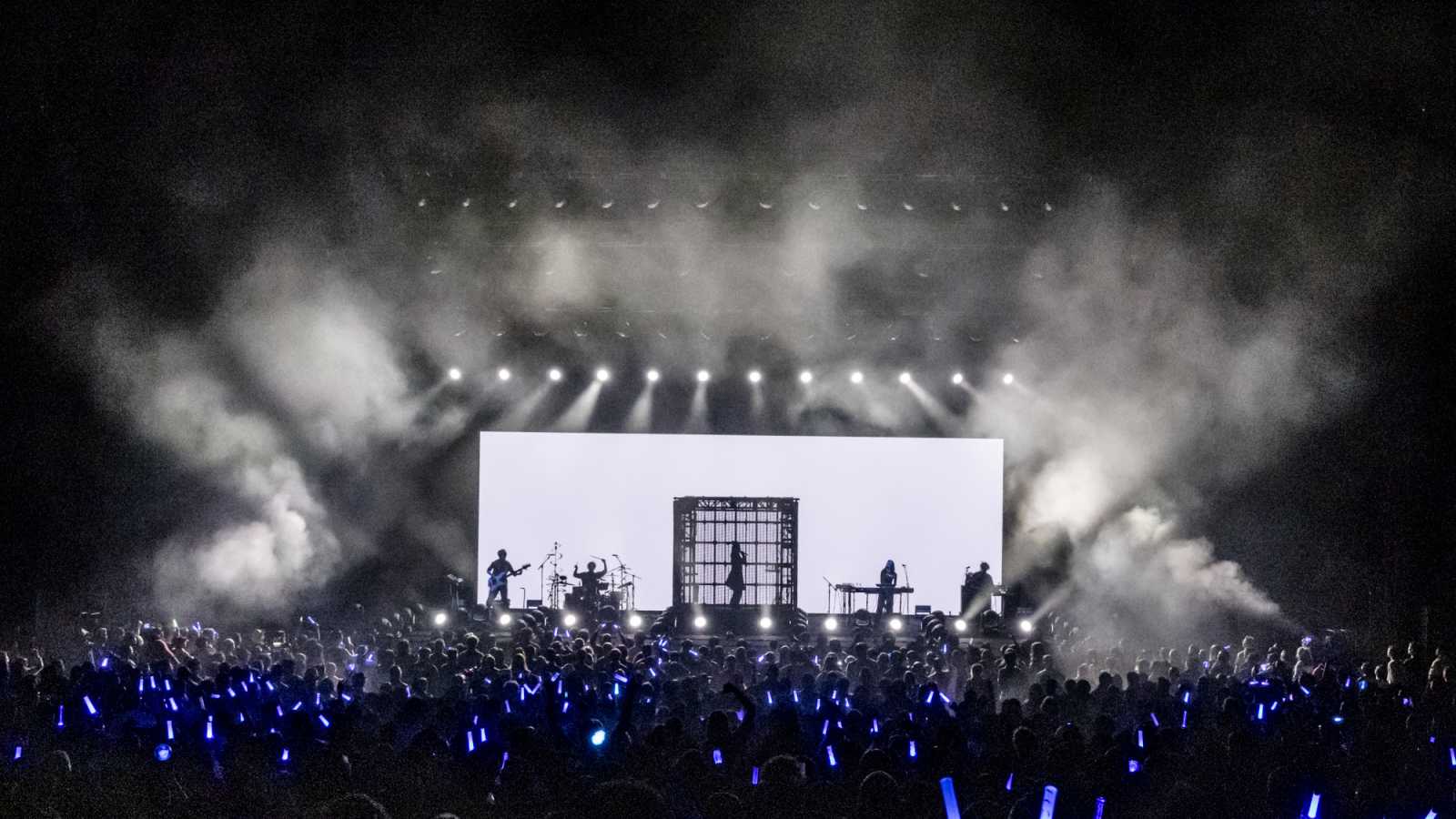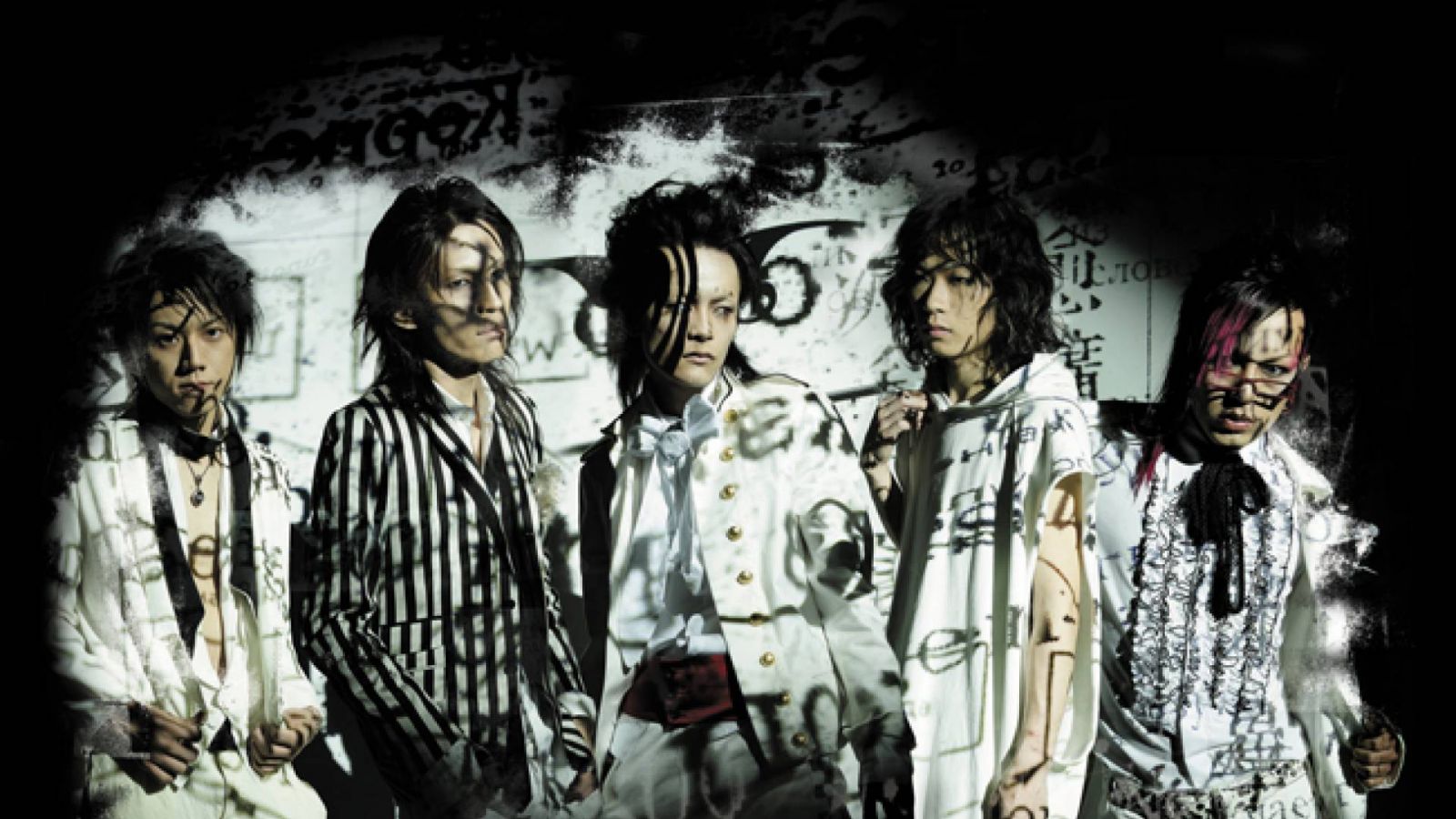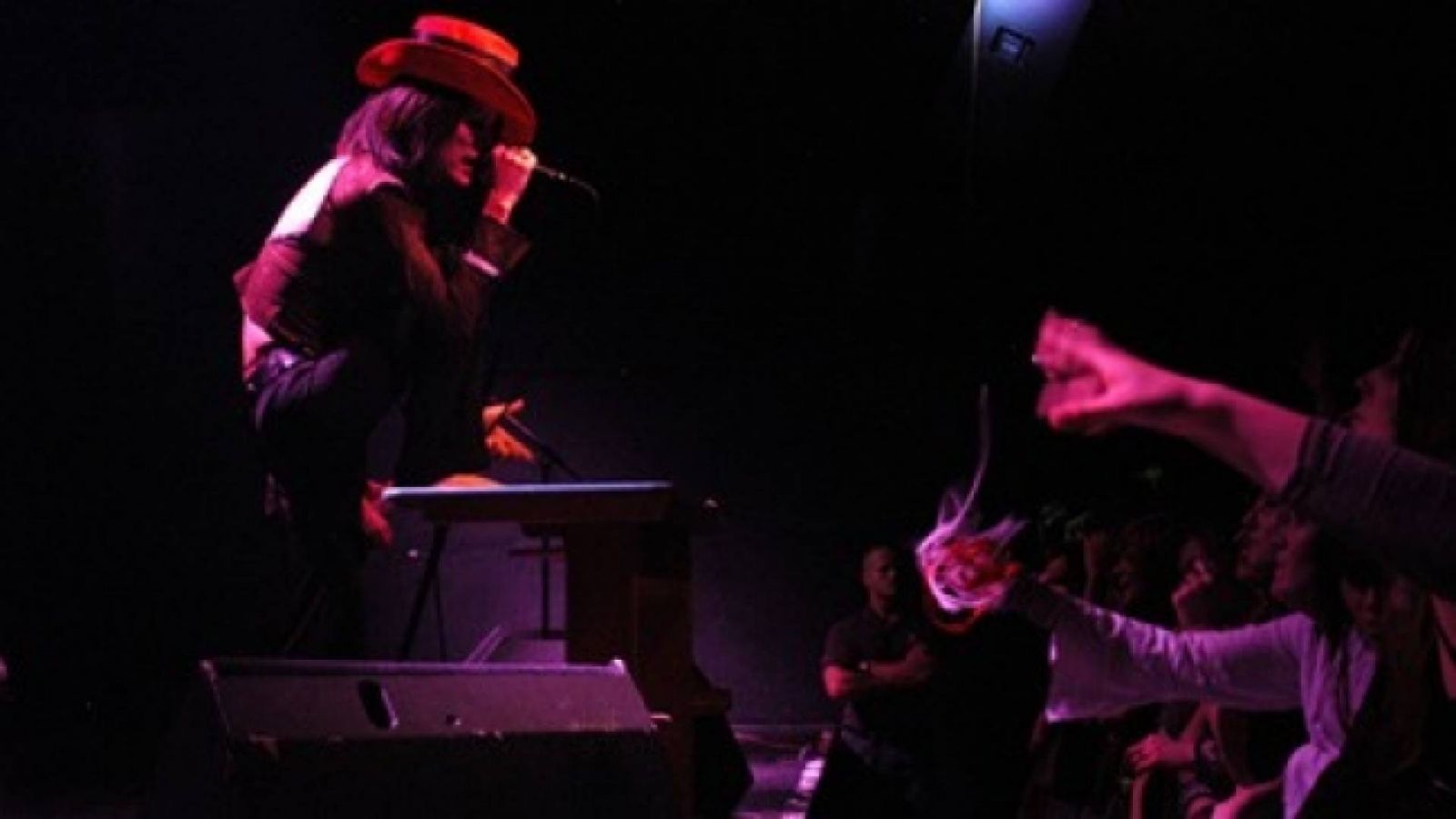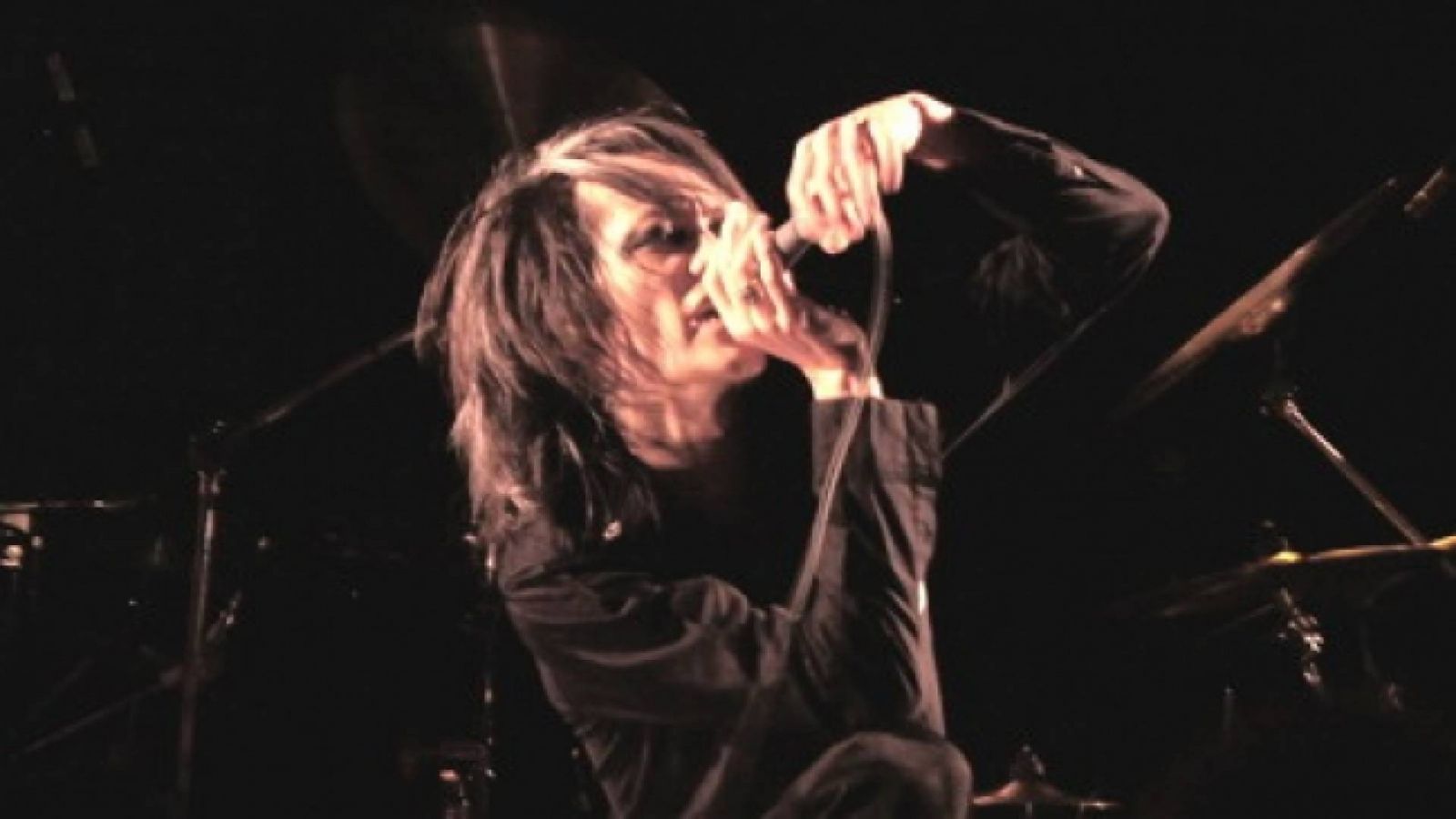After their European tour, we spoke with the members of Merry in Japan.
Back home in Japan, we asked Merry, who had their first European lives in early December in France and Germany, about their thoughts on playing overseas, their international fans, and beer and sausage.
You've finished your European tour, which seemed to go very well. Can you share some of your impressions with us?
Nero: The audience was very enthusiastic and more people came than I thought would. The lives had a very good atmosphere and I felt so happy that I was invited and was able to go.
Gara: I felt the lives were great and I felt the audience had really been waiting for us. In Japan, we release a CD and go on a tour, which we've gotten used to. This time, Victor Records distributed them overseas and people listened to our music in foreign countries. In Japan, people already know our activies well. For overseas people to come see us, it means they really understand us and they really like us. I'm very happy about that.
Yu: Directly speaking, it was good to go. It was really stimulating and we learned a lot.
Kenichi: I thought that well have a feeling of being closely watched, but the audience was more warmhearted than I expected and we could play as though we were at home.
Tetsu: I wanted to go for a long lime, so I was very happy to be able to finally go. I felt fresh because it was the first time for us to go overseas, including for any lives. I learnt and absorbed so many things.
Did you have any troubles with your equipment?
Gara: Well, there were little troubles such as a background CD that didnt work, but other things were OK. But still there was a problem of nuance. Even though there was an interpreter, when I tried to share my feelings, I had trouble making them understand my original Japanese nuances. Once the live started though, nothing was a problem.
Nero, did you have any trouble preparing your drum set?
Nero: Well, its impossible to prepare for everything; it's the same as in Japan. Even in Japan, when we just started our band, we played with other bands in events and we used rental instruments belonging to the live houses. It was a little like that and reminded me of that time. I played while I felt our original strong motivation, which was good experience for me.
Yu, when I looked at your blog, I found you went sightseeing many places, such as Notre-Dame, the Eiffel Tower, the Arc de Triomphe, etc. Did you go there at midnight?
Yu: Yes. This time, we didnt have time for sightseeing in the day time, so we went around 0:00 am to 3:00 am in the morning before the live.
So you couldnt see the inside of the buildings?
Yu: No, we couldnt. At the Arc de Triomphe, there were many people and so many cars running even at 3:00 am, so I thought Paris never sleeps. (laughs)
Gara: Wow!? You all went sightseeing? So only I didnt go. Nero said the phrase strong motivation before, and Ill say I couldnt eat any food so I really felt a strong motivation for food all the time. (laughs)
Do you mean you can only eat Japanese food?
Gara: No, but overseas, everything is so dynamic such as potatoes and meats. I seem to have something against this kind of food, and I have a certain image of potato. When I ate potato, it was gooey, so I thought Oh! This isnt potato! (laughs) Then I really couldnt eat anything anymore.
But you said before that you were looking forward to beer and sausages. How were those?
Gara: Uhn~, not so good. (laughs) I had only one glass of beer.
Yu: He finished everything on the first day. (laughs)
Gara: On the day we arrived, I ate sausage too, so everything was concluded then! (bursts out laughing)
Gara, you said in our first interview "Ill do my best, so please receive my everything and give me back yours, which is felt best at lives. I want to feel that." Did you feel this exchange?
Gara: Honesty speaking I didnt see the fans, but we did only one live in each place, and I wanted to make people who had been waiting for us think Merry is really the same band as I thought they would be, and its great!. I was very concentrated on my world, and I remembered the feeling of our beginnings and that I could go crazy.
Ill ask the same to other members. How was the audiences reaction?
Nero: Before the live started, when the instrumental technicians were checking the sound, the audience was already heated up. It was my first experience overseas, so I was very nervous and afraid before I stood on the stage. But once the performance started, and at every opening of the songs, interludes, guitar solos, the audience cheered loudly. (laughs) It was so energetic that all of my worries and stress blew away.
Was the audience more men than women?
Nero: More men than in Japan, but still less than half.
Yu: The feeling that they earnestly wanted to enjoy our lives was communicated to me by their expressions. I felt a strong aura; like each of our fans had been waiting for us for long time.
Yes, because they cant see you easily like those in Japan. How did you feel, Kenichi?
Kenichi: I felt they were not so different from our Japanese fans basically. I thought everyone came to see us because they really like our music.
I heard that among the audience there were people singing in Japanese.
Nero: That was very impressive. I was so happy to see that.
Tetsu, how about you?
Tetsu: I thought the audiences expectation was not so different, but I felt a big difference of nationality in the way of expression. They expressed their ecstasy like in a carnival, which I have never experienced before. They'd start cheering Woooow~~~~~h! and heating up in the beginning and interlude of songs too. That was very impressive for me.
Were you nervous during your guitar solos?
Kenichi: I wasnt too nervous because whenever I played the guitar, the audience cheered Uooooh~~~!, which made me feel great.
You also said before that you like that the audience moves freely while Japanese are a little bit too coordinated with everyone moving together. But aren't you afraid that the Japanese audience will begin to act differently when they will read this?
Yu: This question seems never come from Japanese. (laughs) Because we're not afraid if the audience begins to act differently. (laughs)
Gara: Basically, we never tell the audience how to move. We just stir them up like Jump up! or Come on!.
Yu: In lives overseas, each person in the audience moves so independently that I felt they didnt seem interested in us.
Gara: Its because of the difference of nationalities, I think. Japanese want to act together.
Yu: If they were interested in us, I think it would be better to act a little bit more uniformly. (laughs)
Gara: Overseas, there is more individualism, I think.
There are foreign fans who like to see the Japanese audience moving in the same way all together, which they feel is wonderful.
Nero: Well, we can say thats also a part of show if we look at it from different view, like a kind of performance.
Nero, people were very impressed to see you so energetic! Where did you find this energy?
Gara: He's energetic because he is cute. (laughs)
Nero: But I think foreigners are even more energetic. I felt that in Germany, foods, such as meats, were all very big! We Japanese usually say foreigners can be loud, and I thought they get their energy from such big foods.
Nero, did you accept the cultural differences and difference in food easily?
Nero: I understand that personality and energy for music is connected to these kinds of things.
But the foreign fans say you look very energetic.
Nero: Im happy to hear that because its my only advantage. (laughs)
Nero, you tried to speak in the local language, and even though many sentences were perfect, a few were not understandable. But the fans were very happy when you spoke to them, because though you made a few little mistakes, they were very happy just because you tried. And they enjoyed it too with easy words in Japanese like "arigato" because they understand it and because you are Japanese, it's the "real you" when you speak in Japanese.
Nero: Well, Im glad if I could make them understand even a little bit. (laughs) When we did our autograph session, I thought they were good at Japanese.
Were you spoken to in Japanese?
Nero: Yes, they tried to speak in Japanese. I was the most nervous during the MC. (laughs) I learnt some words from the staff of NEO TOKYO etc. First I explained what I wanted to say in Japanese, then they wrote down the Katakana, and I tried to memorize them. I spoke but I looked at the part which I couldnt memorize, since the staff said it would be better to speak in a foreign language when I looked at them, because the audience would be happy to see that I tried.
Were you satisfied with your communication with the audience?
Nero: Basically, we communicate through our music, and I think that's the best way for us. The lives themselves were great, so I felt good and very satisfied. I want to go again.
Tetsu, many girls thought that you're more beautiful in person than in photographs. What did you think of European girls?
Tetsu: Im not good at saying it but they are quite attractive. (laughs) I was asked by the staff Why dont you marry a foreign girl?, and I thought Well, it might be nice.
Were they very different from Japanese girls?
Tetsu: We had an autograph session, and there I found their clothes seemed more enthusiastic than fashionable. For example, they had clothing they'd made themselves with something concerning Merry on it, like a corset with a sheep on it. I was very impressed.
Actually, was there anyone who wore official Merry t-shirts who came to your autograph session and lives?
Tetsu: There were people who wore clothes only sold in Japan.
Gara, many people were surprised in France when you begin to suspend yourself from the live house's structure. You are so flexible! Was there anything you wanted to do but couldn't do because the stage was too small?
Gara: Actually I had a feeling of I could do more, but I also thought I want to show my best even in small places. In Japan I put a school desk on the stage so in France I borrowed a French school desk for our live, but fans held on to it and they were very close to me. Oh, when I sang a song, a bra flew near me. (laughs) I looked and it was on the floor, but when I thought I would get it, it already disappeared! (bursts out laughing) I wondered who got it. (laughs) I also couldnt see the girl who took it off, though I wanted to. (laughs)
Yu, I heard you seemed to be comfortable on stage, in front of this new audience. Is that true?
Yu: Well, unexpectedly, I didnt feel any stress so I could play the same as in Japan. The strong response from the audience came directly to me.
Kenichi and Tetsu, I heard you seemed a bit shyer?
Tetsu: No, not at all. If I seemed like that, I think I have more to learn. (laughs)
Kenichi: Im basically a shy guy. (laughs) Even in Japan I cant look the audience in the eye.
But you play guitar very hard.
Kenichi: I tried to do lives in the same fashion as in Japan.
Yu: I went overseas for the first time and I cant understand foreign languages nor am I good at communicating by gestures or body language at all. (laughs) When I played on stage, I realized I was able to communicate with the audience for the first time and it felt very good.
European people like to touch artists during lives. Were you surprised? Physical contact is not popular in Japan, so how did you feel with kissing and touching?
Gara: I was touched, but its the same in Japan, so I wasnt so surprised.
During your autograph session, did anything like that happen?
Gara: Someone said Please hug me!, but I pretended not to hear it. (laughs)
Nero: Since I heard Kissing is a greeting overseas, I kissed cheeks. (laughs) But Kenichi refused, saying that he was shy. (laughs)
People were very glad you played so many songs during two hours. Do you always play so many songs?
Yu: Our European lives were rather long, I think. Recently, the number of our songs are increasing and I want to play older songs too, so we play about 20 songs in a live.
Which song did the audience respond the best to?
Gara: I think they responded more in ballads.
Yu: There is a gap between Japan and overseas. In Japan the audience stands still listening closely to quiet melodic songs, but overseas the audience was in full swing even in such ballads. Imagine, sorrowful sounds made them cheer Uooooh~~~! (laughs)
Was that a big difference?
Yu: Yes. That was the biggest difference.
Gara: But it might only seem strange because we've become used to it. In Japan, the audience listens closely to ballads while then everyone, including the vocalist, moves violently in hard songs. This might've become of a fixed idea without anyone noticing. When we went overseas, we found it was different; 'they like this.' It reminded us of our original intentions.
I think your ballads are quite hot.
Gara: Overseas, we had some interviews. I had been thinking before that there is no wall in music, but I found there actually is one. Since they cant understand the lyrics, they try to listen carefully to our music and melodies and judge if the songs are good or bad that way. I thought it was the best thing for us that people listen to our music carefully and come to our lives full of energy. Whats more, if they also understand the meaning of our words, I think they will be even more moved, and will understand our songs fully. Only our music and melodies move them now, which makes me think that we can do more and more from now on.
Did you do calligraphy in lives overseas?
Gara: Yes I did.
Did you write in French or German?
Gara: I wrote katakana, and a little bit in the foreign languages. But the culture of calligraphy is originally in Japanese, so I thought the younger people might not understand it.
But I think Merrys fans know it.
Gara: I put Bokuju (India ink) into my mouth and spit it out on the stage, but that was the worst response ever! (bursts out laughing) In Japan everyone knows Bokuju well and they can imagine how it is so they are surprised. Oh my god~! He put it in his mouth!. But overseas, I think people dont know how awful it is. I felt very lonely at that time. (laughs) So next time, before I will do it on the stage, Ill try to serve Bokuju to let them know how it smells etc. (laughs) So people will know and will react more like Uaaaah~~~! He is crazy! (laughs)
How about writing with Bokuju in your autograph session?
Gara: Woh, thats a good idea!
If you go back overseas, you'll have many chances to have a bigger audience because fans know you and your live impressed a lot of people. How many people would you want to come?
Gara: Well, if each of the 400 people tell their 2 friends, 1200 people will come, so I hope to play in venues of more than 1000 capacity and that more and more people will come to see us.
You'd do well to play not only in France and Germany, but also other places.
Gara: Yes. I hope to be a band that people know and will want to come see.
After the European lives, you did the Japanese domestic tour [Many Merry Days #2 ~PEEP SHOW~]. Was there any jet lag or break?
Gara: Since we are musicians and we arent bound by time exactly, there wasnt a jet lag, but we had a gap.
Kenichi: I felt rather lagged everyday. (laughs)
Gara: With the same feeling as doing lives overseas, we did our first live in Japan which were meant as additional lives of [PEEP SHOW]. Being back in front of a Japanese audience after going overseas, we were too relaxed and the result was bad. So we reflected on this and kicked the tension back up.
Yu: This time we went overseas and found the good points of both the Japanese audience and the foreign audience.
Did you feel relaxed when you came back to Japan?
Gara: Of course. About food, towns, everything- I felt just like I came back to my home country, Japan! (laughs)
I saw your DVD [Many Merry Days #1~Hibiya Yagai Daiongakudou~2006.7.30] released on December 20th. Nero, you looked great collaborating with the Japanese drums! You said Next time a great DVD will be released! in your last JaME interview. (laughs)
Nero: French staff came to see that live, and next day when I saw my senior bands live, the same French staff came to see the live and said Please do the collaboration with Japanese drums! because Japanese drums are Japanese original instruments. Well, if next time the capacity of venues is bigger and it is possible, I really want to collaborate with them.
Gara: It means that if more people want to see us, we can put on lives in which we can perform to full scale.
Nero: That was our first performance overseas so we had to have really strong motivation.
Tamagawa Taikos members wore the same glasses as Nero. How many times did you rehearse with them?
Nero: It was quite a difficult schedule so we rehearsed together only about two times. Without me, they played very well. Usually my bands members follow by my lead, but this time I had to fit to the Japanese drums, so it was very difficult. But it was a very good experience for me.
Did the members of Tamagawa Taiko say something after the live?
Nero: They are university students and many of them were the 4th grade, so they said This will become a very good memory. If its possible, I want to play with the same members next time too, but I think they will have gone into society individually. I want to play with them again if I have a chance.
This DVD is very tasteful including images of scenery shot from a helicopter and members off shots. Did you come up with this together?
Gara: Yes. The venue was the same place as last year, so we wanted to show our development and compilation of that whole year. We talked to the video director and said Please make it better than last year. Then he said, You're all better than you were last year, so naturally the video will be better too.' When I saw it, I thought 'Wow, its good!'.
Putting various images between the live images is interesting; it's like a documentary and live mixing.
Gara: I agree with you. I guess we don't get tired watching it, and we can see the time progress during the live.
Gara, at that time your performance climbing up and suspending yourself from the metallic structure on the stage was amazing!
Gara: I did my best! (laughs)
How will the two-man live with BALZAC from February 2007 be?
Yu: We havent done two-man lives for a while, and BALZAC is an artist which we wanted to do a live with, so I think we can learn a lot and gain inspiration from them.
Your band is celebrating your 5th anniversary this year. What is your aspiration for that?
Nero: These five years have passed so fast, but this time we released the 5th year anniversary single that we collaborated on with BALZAC and THE MAD CAPSULE MARKETS. We worked with these two bands which're pioneers in the Japanese music scene. We're not only proud of that, but well work harder yet to make Merry a great band!










